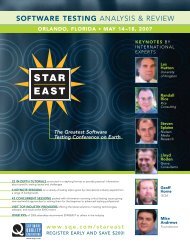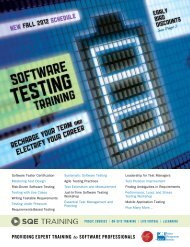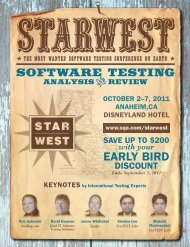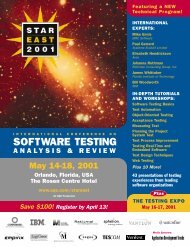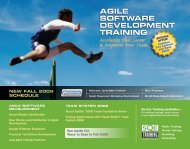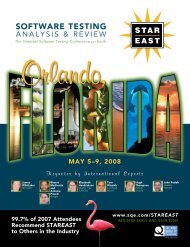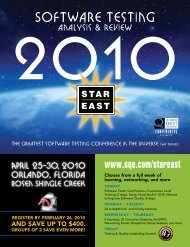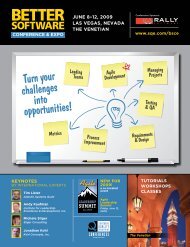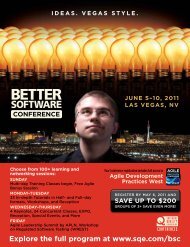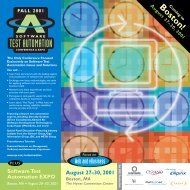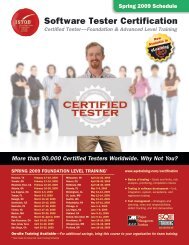Agile Development Practices Conference - SQE.com
Agile Development Practices Conference - SQE.com
Agile Development Practices Conference - SQE.com
Create successful ePaper yourself
Turn your PDF publications into a flip-book with our unique Google optimized e-Paper software.
keynote sessionsAGILE experts share insightWednesday, november 11, 8:30 a.m.Beyond Scope, Schedule, and Cost: RethinkingPerformance Measures for <strong>Agile</strong> <strong>Development</strong>Jim Highsmith, Cutter ConsortiumA recent Business Week article proclaimed, “There is no more Normal.” With businesses in the throesof pervasive change, the traditional emphasis on “following the plan with minimal changes” must besupplanted by “adapting the plan to inevitable changes.” If agile development practices are aboutfocusing on and delivering customer value, then how can adherence to traditional scope, schedule,and cost be a good way to measure performance? It can’t. Jim Highsmith explains the need to movebeyond the classic Iron Triangle measures to instead focus agile software development success onvalue, quality, and constraints. Even today, many agile teams are asked to be flexible and adaptive andthen are told to conform to planned scope, schedule, and cost goals. They are asked to adapt—insidea very small box. If we are to bring truly agile values to our organizations, then we must change ourperformance measures. To paraphrase the <strong>Agile</strong> Manifesto, it’s not that scope, schedule, and cost areunimportant but that value and quality are more important. Jim explores the rationale behind movingto this new set of agile performance measures.The president of Information Architects, Inc. and director of the Cutter Consortium’s agile consulting practice,Jim Highsmith has more than thirty years of experience as an IT manager, product manager, project manager,consultant, and software developer. He is the author of <strong>Agile</strong> Project Management: Creating Innovative Products,<strong>Agile</strong> Software <strong>Development</strong> Ecosystems, and Adaptive Software <strong>Development</strong>: A Collaborative Approach toManaging Complex Systems, winner of the prestigious Jolt Award. Jim is co-author of both the <strong>Agile</strong> Manifesto andthe Declaration of Interdependence for project leaders, founding member of the <strong>Agile</strong> Alliance, and co-founderand first president of the <strong>Agile</strong> Project Leadership Network. Jim has consulted with IT and product developmentorganizations and software <strong>com</strong>panies on five continents.Wednesday, november 11, 4:30 p.m.<strong>Agile</strong>: Resetting and RestartingAlistair Cockburn, Humans and Technology, Inc.The <strong>Agile</strong> Manifesto—ten years in the making—was published in 2001. Now, with more than eightyears of practice, the manifesto has greatly influenced the process of software development. Ithas influenced the IEEE’s software contracting models, the Project Management Institute’s view ofsoftware project management, the Software Engineering Institute’s CMMI assessment model, andhelped change the development process for thousands of organizations around the world. Duringthese years, agile practices have moved forward and continued to mature, adopting ideas from leanmanufacturing and the theory of constraints to add more rigor to our work. Still, many agile projectstoday tend to fail because they are overly tactical and do not take the long-term view. Join AlistairCockburn, one of the seventeen original signers of the <strong>Agile</strong> Manifesto, as he re-examines the originalthinking behind the manifesto, where it has succeeded, how it has been perverted, what is happeningin the agile world today, and how agile practices might evolve in the <strong>com</strong>ing years.Alistair Cockburn, one of the founders of the agile movement, was voted one of the “The All-Time Top 150i-Technology Heroes” in 2007. He calls himself a “project witchdoctor” because people still don’t understand howimproving trust and <strong>com</strong>munication improves project out<strong>com</strong>es. Known for his lively presentations and interactiveworkshops, Alistair is internationally renowned for his expertise on project management, agile development, usecases, and teaching. Two of his books, <strong>Agile</strong> Software <strong>Development</strong>: The Cooperative Game and Writing Effective UseCases, have won Jolt and Jolt Productivity awards. His blog, poems, articles, and talks are available online athttp://alistair.cockburn.us.16Call 888.268.8770 or 904.278.0524 to register • WWW.<strong>SQE</strong>.COM/ADPREG



